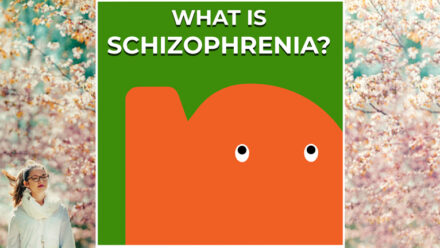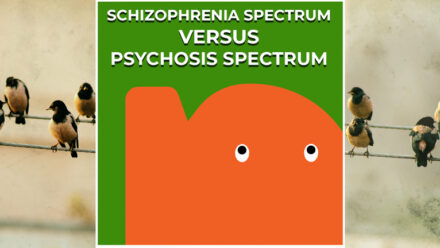
Lots of research into schizophrenia and psychosis has been done in the last twenty years. Research has now demonstrated that psychosis is actually part of human variation. Psychosis is about states of ‘hyper-meaning’ (perceiving an incredible amount of personal meaning in your inner and outer world) – and it happens to everybody.
This type of mental variation is actually something that you can learn to deal with, when given the right kind of help and support. This idea is completely opposite to the current official diagnosis of schizophrenia, which is linked to very negative expectations. It is seen as a serious and permanent brain disease, which gets progressively worse and is incurable. Because of these false assumptions, many now say that the term ‘schizophrenia’ should be dropped altogether. It is probably only a question of time.
Of course, nothing is wrong with the name schizophrenia
There is nothing wrong with using the word schizophrenia for a range of related symptoms. The problem is how careless and unfounded the term is linked to negative expectations about the patient’s future. Scientifically speaking, there is a broad spectrum of closely related diagnoses in which psychotic symptoms can occur. Yet the number of people diagnosed with schizophrenia is much smaller. Of this minority, a small number of people do not recover and permanently experience serious suffering.
We learned from the Recovery Movement (an approach based on experiential knowledge that recognises the ability of patients to recover from their disorders, in the sense of regaining perspective and the sense of a meaningful life despite ongoing problems) that even when medical recovery is not possible, people are still able to change their perspective on life. So much even that mental health patients, despite their permanent serious disabilities, can still live a meaningful life. This is called personal recovery.
But looking at mental illness in this way, requires a huge cultural shift in society. It is the only way to create a culture based on hope and belief in improvement of mental conditions. That is what this debate is mainly about.
Although the recovery movement has been active for over 25 years, there still is a lot of ignorance. The principles of personal recovery are often misunderstood. Especially the important difference between medical recovery (reducing the symptoms) and personal recovery (living a meaningful life) is often misunderstood among biological psychiatrists.
The wall of pessimism placed before schizophrenia patients
Let’s take the true story of a real person who had a psychotic disorder. She had received almost every diagnosis that exists, including the schizophrenia diagnosis. Her family noticed with how much pessimism and negative expectations she was approached, both inside and outside the world of mental healthcare. They saw how this could in part be explained by the pessimism that has been created around the schizophrenia diagnosis.
A psychiatrist notified the family about her narcissistic desire to apply for a job. Without any hesitation, he dismissed this desire as unrealistic.
When she finally found a job, years later, her boss tried to fire her within the first week. The reason: he had discovered she was once diagnosed with schizophrenia.
Another psychiatrist told her gynaecologist that she should not get permission for in vitro fertilization (help with getting pregnant) in response to her desire to have children. Indeed: based again on nothing but her diagnosis.
No recovery without hope
Of course, this story also included some fantastic contacts with inspired psychiatrists, psychologists and other mental health professionals. But even they had to work in a culture were the concept of schizophrenia is surrounded by a grim pessimism. Low expectations and negative prospects for the future were the norm. This pessimism seems to work contagious. And that can lead to the idea: why should we invest in that mass of chronically ill people if they will never get better anyway?
Is this pessimism about schizophrenia justified?
The answer is: no, it is not. The hard data show that most people diagnosed with schizophrenia do recover. Or at least they learn to live with their vulnerability. Even when the medical recovery turns out to be impossible.
Another lesson from the Recovery Movement: even people with serious and seemingly hopeless cases of psychosis can still find new perspectives on life. A view on life that allows them, even in the face of serious mental disabilities, to still experience a meaningful and pleasant existence.
This is called personal recovery
Personal recovery is only possible if one is given hope, a belief in improvement and in their own personal strength. This hope can be found together with others who have (had) patient experience. Yet it is just as crucial that this hope is also recognised by society in general. And within the influential field of biological psychiatry.
What if indeed your family member is not able to recover, in a medical or personal sense? Our advice: do not give up, but stay hopeful. There simply is no reason to say: give it up, you are diagnosed with schizophrenia, which means you have a devastating brain disease and will never recover.
Compare schizophrenia with diabetes
Diabetes is also a spectrum of symptoms to which patients can adapt quite well. Yet a minority of patients do not respond to treatment and suffer serious complications. So do we invent a special diagnosis for this group, with a misleading description of their disease? A name which is only given with the purpose of pointing out that these patients form a group that will never be cured? This cannot be the goal of a diagnosis. On the contrary, a diagnosis is formed to point out what can be done to help, instead of making patients and their loved ones more desperate than they already are.
What is the reason for all this pessimism?
It is not hard to explain why schizophrenia is seen in such a negative light. Listen how experts within biological psychiatry speak of schizophrenia. They call it a devastating brain disease of which you can never recover. Even the most respected science magazines, such as Nature and Science, have been saying for years that schizophrenia is a genetic brain disease that has no cure. Even though this conclusion is in conflict with data on how the disease progresses. This is what the world’s most prestigious scientific journal, Science, has to say about schizophrenia:
‘Once the symptoms of schizophrenia occur, they persist for the entire lifetime of the patient, and are almost totally disabling’ .
Of course, the field of biological psychology has our best interest in mind. But still they determine what image society has of schizophrenia patients. And this includes the image held by the policy makers who decide how many (financial) resources must be spent on mental healthcare. Why spend money on care for people who will never recover anyway?
But keep in mind: there is NO scientific proof that you can indeed regard schizophrenia as a disease of the brain. It sounds convincing. It’s what the media often tell. But it is simply not true in a scientific sense. We could almost wish it were that simple, because the truth is less clear-cut and much more complicated.
If only we could call it a genetic brain disease
The truth we are stuck with is much more complex. So we should stop talking about schizophrenia as a brain disease. There is no use in informing patients with incorrect ideas. Of course we can say: there would not be schizophrenia or psychosis without the brain. But that goes for all mental experiences, both healthy and sick. And the reverse is also true: there would not be a brain without our mental experiences. That may sound illogical, but the development and programming of our brains are actually determined by our mental experiences – from our first days in the womb onwards.
Why do many biological psychiatrists still speak of brain disease?
A leaflet of European country Psychiatry Association, until very recently, said the following:
‘Schizophrenia is a disease of the brain (…) that cannot be cured (…) in which there is a disturbance in the activity of certain areas of the brain. This reveals itself in a disturbed balance between the chemicals required for the proper working of nerve cells. Anti-psychotic medicine can be used to partly restore this balance.’
In the recent past, researchers in biological psychiatry even spoke of a progressive (meaning: gradually worsening) brain disease.
But how did they get this idea of schizophrenia as a (progressive) brain disease? In short: because studies have shown that there are minimal differences in the biological variables between patients and non-patients.
What does that mean?
Suppose we make brain scans among 100 people diagnosed with schizophrenia, and among a 100 regular people. This will reveal very small differences between both groups. On the basis of such differences, researches then draw the conclusion that these differences in the brain must be the cause of the disorder. The small average differences are presented as deviations that can serve as a biomarker for the schizophrenia diagnosis. But the crucial fact that is left out, is that these group differences are too small to allow for individual predictions. When this is taken into account, the story of schizophrenia as a progressive brain disease turns out to be a myth.
A good example to explain the issue further, is the research into the hereditary character of schizophrenia. In this field, biological psychiatry has made quite some progress. You can read it in the media from time to time: new genes discovered that are linked to schizophrenia!
But if you look closely at their findings, the story is not what is seems.
Because what is the main conclusion to be drawn from these results? That every person has hundreds or even thousands of genetic variations that can each increase the risk of being diagnosed with schizophrenia.
In other words: we are all at risk of becoming psychotic
The genetic variations that lead to the diagnosis of schizophrenia are not specifically linked to disease. Moreover, they also occur with other psychological syndromes, such as bipolar disorder and depression.
The truth is that 50 years of extensive biological-psychiatric research has not identified a single diagnostic biomarker, for not a single psychological disorder. The main revelation of biological psychiatry is that there are no diagnostic results from which we can derive that mental disorders (such as schizophrenia) can be traced back to one specific disease. Not the kind of conclusion that is popular in the press. And therefore this truth is hardly understood by most people.
The dilemma of biological psychiatry
After decades of presenting schizophrenia as an actual brain disease, this oversimplification has led to a huge problem. The scientific conclusions that it’s an objectively measurable brain disease, cannot be backed up by evidence. And as it should be in the scientific world, this leads to critical questions – the kind we are posing right here. Not to degrade or irritate anyone, but to create a more nuanced and less desperate perspective on mental health issues. The time of simply labelling a psychiatric patient must come to an end. The complexity of psychological disorders is simply beyond our current understanding in terms of ‘diseases of the brain’.
We support biological research
The researchers behind Psychosisnet.com also do lots of biological research in the field of psychiatry. It is definitely an important field, which we regard as very valuable. What we are against, however, is the oversimplified explanation of uncertain research results. Especially when this misinterpretation has negative consequences on the well-being of patients.
Experts only see the worst cases
There is another explanation for the current pessimism. The academic psychiatrists who determine the definition of schizophrenia, only see the patients who are doing the worst. People who experience relatively mild psychoses, never get in touch with experts. These are the people who succeed in recovering on their own, or with help from a general practitioner, psychologist, alternative healer, or other form of help.
It’s therefore no surprise that the best experts of academic hospitals think that ‘mild’ cases of schizophrenia do not exist. They simply never see these patients and get in touch with these milder cases. There is even a name for this: Berkson bias is the effect that doctors overestimate the seriousness of a disease. This phenomenon also happens in psychiatry.
The problem with Berkson bias is that new patients who reach out to mental healthcare may still have a great chance of recovery. Yet they are confronted with the expectations and pessimism based on the very worst examples of their illness. In other words: Berkson bias means that the most negative of expectations define the image of the full spectrum of the disease. As if our view on diabetes would only be based on the small minority that does not respond to treatment. Or as if doctors regard the flu as a deadly disease, because they only see elderly people with weak immune systems that need treatment, but never the many people who get better in a few days.
Does schizophrenia always lead from bad to worse?
The hard core biological psychiatry claims that the negative expectations about schizophrenia are caused by the underlying biological description of the disorder. This regards it as a progressive disease, meaning it gets worse as time goes by. However, independent research paints a much more subtle picture. Much of the negative progression is not actually caused by the disease itself, but by other factors.
What other factors determine the progression of schizophrenia?
When patients see their schizophrenia getting worse, this is often caused by a lack of healthcare and treatment. Offering support such as psychotherapy, job coaching, voice hearing groups, open dialogue, community retreats and recovery colleges have been proven successful in dealing with schizophrenia. Treatment should be aimed at providing social holding and not just symptom reduction. Another cause are negative reactions from society (and the patient’s own social circle), which often results in understimulation (i.e. doing less than you are capable of). Patients are often subdued by medication, or avoiding treatment. Other worsening factors are the social consequences, such as loneliness, unemployment and poverty.
Another reason why schizophrenia can get worse, is the presence of other untreated psychological disorders. Schizophrenia often comes together with posttraumatic stress disorders, depression, addiction or substance abuse, and cognitive disabilities. All of these factors can have a negative impact on treatment and recovery. Yet all of these problems are actually solvable. So why this negative idea that all of these are an inherent character of the biological disease?
At least one national research committee in the United Kingdom came to a wholly different conclusion. They noticed that the negative outlook for schizophrenia patients was partly due to the British mental healthcare services, which they described as a ‘completely dysfunctional system’. In England, healthcare services themselves thus concluded that the prospects for schizophrenia patients could improve, and must improve, through better healthcare.
DSM-5 says: schizophrenia does not exist
This is not our claim. This is what the DSM-5 says. It states that schizophrenia consists of several criteria that together give a rough description of a group of patients, to enable psychiatrists to communicate with one another. The DSM-5 clearly warns that we must not think of schizophrenia as a real disease with an objective description. It can’t be, because the criteria for the diagnosis change with every new DSM update. Correspondingly, every international system of classification has its own criteria for diagnosing schizophrenia. These criteria are thus not as fixed and permanent as some seem to think.
Diagnosis in England is different than in the USA
How is this possible? The term schizophrenia is, for example, defined differently by psychiatrists in different European countries. This is because some countries use different systems of classification. Instead of the American DSM-5, some countries use the ICD10, created by the World Health Organisation.
What’s the difference?
Compared to the DSM-5, the ICD10 has a broader and more optimistic definition of schizophrenia. That’s because the DSM-5 sees schizophrenia as a chronic condition by definition, while the ICD10 says this is not always the case. ‘Schizophrenia’ thus is nothing but an agreement, and its diagnosis changes over time and differs from country to country. As we have said: it is not an objective disease.
We do not deny that some people are mentally ill and suffering seriously
Let there be no doubt about this. Of course people are suffering from mental illness who definitely need care. Yet we do say that these patients are burdened with false ideas and expectations of their future that are much too negative. Ideas and expectations that are created by anonymous commissions, and change constantly.
If schizophrenia is not an objective disease, how can we inform, diagnose and provide care?
Every person runs the risk of becoming psychotic – as we explained. But not everyone gets the kind of psychosis that requires (professional) help. Psychosis is a mix of various symptoms, such as delusions, hallucinations, problems with concentration and memory, motivational problems and depression or mania.
Each patient has its own unique mix of symptoms, meaning there is a very broad spectrum of how psychosis vulnerability can manifest itself. We call this the psychotic spectrum syndrome, or Psychosis Susceptibility Syndrome, abbreviated as PSS (George and Klijn, 2013). PSS includes al those different DSM-diagnoses such as schizophrenia, schizo-affective disorder, schizo-phreniform disorder, delusional disorder, affective psychosis, psychosis NOS (‘not otherwise specified’), brief psychotic disorder, substance-induced psychosis, etcetera.
A bit of this and a bit of that. The syndrome called PSS
Scientific research shows that al those different DSM diagnoses summarized by the term PSS, are difficult to distinguish from one another. In fact, they are all part of the same psychosis spectrum. Together they form PSS.
About 3.5 percent of the population suffers from PSS, of which fewer than 30% eventually are diagnosed with schizophrenia. Schizophrenia is at the very end of the psychosis spectrum, where the patients with the most serious symptoms are found.
Strangely enough, there currently is only one diagnosis of psychosis that really matters. And that is schizophrenia – regardless of how it is defined. But the diagnosis of schizophrenia is only a small part of this much broader spectrum of DSM-diagnoses related to psychosis. We have completely overlooked this fact. Therefore we will now take a look at the full spectrum of PSS, instead of focusing solely on the small minority who represent the worst cases.
Why is PSS called a syndrome and not just a disease?
PSS is called a syndrome instead of a disease because this term offers a more accurate description. In healthcare, the term syndrome means a mix of symptoms, that can (but don’t necessarily) occur together. It is often unclear if these symptoms can all be explained by one underlying disease, or by several diseases. And maybe there isn’t any disease at all, only unexplainable symptoms. We simply do not know for sure.
Using the word ‘syndrome’ thus means admitting that you actually don’t know the exact cause and therefore won’t jump to any conclusion. Instead of masking the uncertainty with unproven explanations and genetic terms from the field of brain research, a more humble approach that prevents misunderstanding seems more fitting. Especially when these misunderstandings can have a negative impact on the lives of many people.
Let’s compare psychosis and schizophrenia with cancer. Another general term we use for many different kinds, of which some are understood and others are not. Let’s look at the psychotic spectrum in the same way: PSS is a very broad umbrella term. And who knows what other mental disorders are yet to be discovered as a form of PSS?
Towards a more personal diagnosis
PSS as a diagnosis is in fact so broad that it always demands a more detailed and personal description. What is the specific mix of symptoms with this unique person with PSS? This particular mix is the patient’s personal diagnosis. Thus although the first diagnosis might be named PSS, it cannot be used to treat all patients the same and stereotype them, as is currently done with schizophrenia. PSS is too broad and too diverse for this. The first diagnosis should only indicate the need to make a more personal diagnosis for this unique individual, based on the specific mix of his/her symptoms .
Conclusion: let the future begin.
We are not the only ones, and not the first
Around the world, more and more powerful voices speak out to dismantle the schizophrenia myth . This is actually not a new development. As early as 1976, a famous psychiatrist, Herman van Praag, spoke of the ‘impossible definition of schizophrenia’ and of ‘the tunnel vision of biological psychiatry’.
Our message is this: please stop the use of all those academic, but scientifically meaningless schizo-definitions. Stop making these pessimistic predictions, and rather offer realistic, scientifically correct and thus effective help to people struggling with PSS. A personal diagnosis would be a good start for this.
We are talking about a syndrome that affects 3.5 percent of the population, of which a majority recovers in the clinical sense.
And for those who do not recover in the clinical sense, we must do everything we can to relieve their suffering. Nobody deserves to be condemned to a lifelong negative perspective, through a combination of cultural bias and an unfounded diagnostic conclusion. Personal recovery, in the sense of experiencing a fulfilling and meaningful life, is possible for all patients diagnosed with psychotic disorder.
Psychosisnet.com is dedicated to contribute to the probability of recovery for as many people with PSS as possible. We want to help them learn to deal with their mental vulnerabilities and enable them to live a meaningful life.




